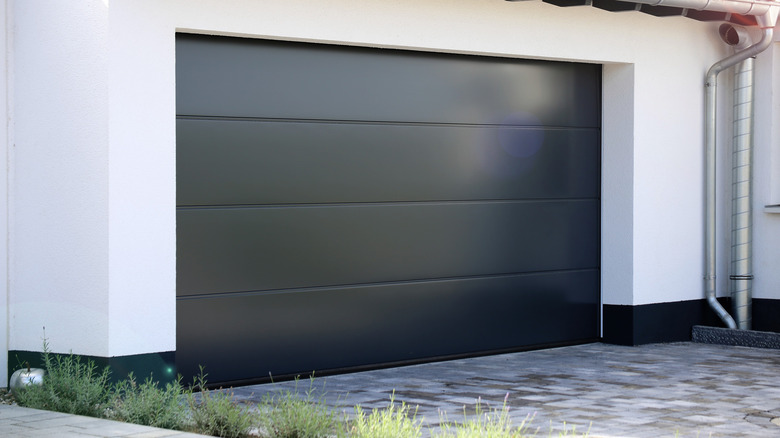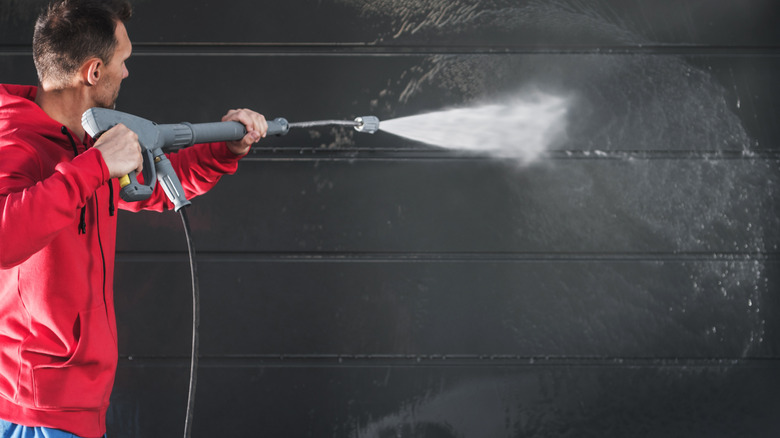You Shouldn't Paint Your Garage Door This Color. Here's Why
Designing an exterior that surpasses conventional suburban neighborhood decor is vital for many homeowners. From front doors, window trims, and porch lighting to landscape design, there are plenty of things residents tinker with to set their home apart. Garage doors, too, are joining the list. Think of them as the new exterior accent that can give your house an enviable glow-up. However, if you're thinking of painting your garage door black, you might want to reassess your decision. For starters, you might be in violation of your neighborhood's or HOA's rules. Besides that, black garage doors can also be difficult to match with your exterior and may give your home a less-than-ideal appearance. They're also energy-inefficient and high-maintenance.
While no other shade screams elegance, sophistication, and lavishness like black, matching black garage doors to your façade without disrupting visual harmony can be a daunting task, with many likening them to "black holes." But even if you manage to color-coordinate them with the exterior by using white or red-bricked walls, they can make the home look a tad bit smaller and possibly uninviting for those pulling up your driveway. In case you're not yet convinced, discover more about the other reasons why this color choice may not be ideal for your garage doors.
Black garage doors are energy-inefficient
Unless you live in a cold region where the sun is a prized commodity and keeping your garage heated is foremost, slathering the doors with a popular black paint color to make a statement will overheat the surface as well as its poorly-insulated innards, making for a highly-unpleasant and uncomfortable experience when in the garage. If your garage faces the south or the west, falls directly in the sun's line of sight, or you live down south with temperatures breaching 95 degrees Fahrenheit during the summer, this can be even worse. As a color that loves soaking up all light wavelengths, black paint is a surefire way to jack up your energy bills.
But that's not all. If your garage's doors are made of wood, there's a high probability that they'll fall into the vicious expansion-contraction cycle (thanks to the heat), causing them to warp and crack down the road. The risk posed is compelling enough for several manufacturers to void all guarantees for doors painted black. Their steel equivalents have it worse, with some delaminating and losing their insulation from excessive heat retention.
Black garage doors are high-maintenance
Because the sun will build up heat on your black garage doors, this will cause them to develop a chalky film and weather them quicker than they otherwise would. This heat may also eventually loosen the paint's adhesive, triggering its peeling and leaving your curb an unsightly mess. "Darker paint colors also tend to fade more quickly, requiring more frequent repaints to keep them looking fresh," Trina Rogers, a color consultant, told Better Homes & Gardens. Such retouching makes upkeep expensive. Not to mention, it's harder to successfully paint over your garage doors with lighter shades if they've already been painted a deep tone.
Moreover, as they're exposed to nature's vagaries, pollution, car traffic, and, well, humans, garage doors are quick to sop up and show dust, dirt, pollen, grime, soot, debris, and fingerprints. Being light-toned, these stains, as well as any scratches or other markings, will contrast against the black paint. Their visibility is amplified multifold, depriving the garage of the elegance it was initially painted dark for. This calls for extensive cleaning of the garage doors, which wouldn't be the case for those painted a traditional white color.


